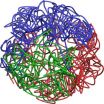Discus fish parent young like mammalian mothers
2010-10-30
(Press-News.org) Few fish are famed for their parenting skills. Most species leave their freshly hatched fry to fend for themselves, but not discus fish. Jonathan Buckley from the University of Plymouth, UK, explains that discus fish young feed on the mucus that their parents secrete over their bodies until they are big enough to forage. 'The parental care that they exhibit is very unusual,' says Buckley. Intrigued by the fish's lifestyle, Buckley's PhD advisor, Katherine Sloman, established a collaboration with Adalberto Val from the Laboratory of Ecophysiology and Molecular Evolution in Manaus, Brazil, and together with Buckley and Richard Maunder set up a colony of breeding discus fish to find out more about their strange behaviour. The team published their discovery, funded by the Leverhulme Trust, that discus fish parent their young like mammalian mothers on 29 October 2010 in The Journal of Experimental Biology at http://jeb.biologists.org/cgi/content/abstract/213/22/3787.
Unfortunately, discus fish are notoriously difficult to bred and keep in captivity. 'Hobbyists didn't succeed in rearing them until the 1970s,' explains Buckley. Having imported 30 adults from breeders in Malaysia, the team reproduced the breeding conditions in the Amazon during the dry season to encourage the fish to spawn. They lowered the water level and left it for a few hours before topping the tank up with cold water, and repeated the process until the pair was ready to lay their eggs. Buckley also collected samples of the orange mucus from the fish's flanks before they spawned and at various stages after the eggs had hatched, and monitored the parent's behaviour as their offspring grew.
During the first 3 days after hatching, the fry remained attached to the cone where the parents laid their eggs, absorbing the yolk and gaining strength until all of the fry were able to swim independently. Then they left the cone en masse and began feeding on their parents' mucus, feeding for up to 10·min by biting at the parent's side until the parent expertly 'flicked' the shoal over to its partner to continue feeding. The parents diligently fed their young intensely for 2 weeks. However, 3 weeks after hatching the parents' behaviour began to change as they started swimming away from their young for brief periods. At the same time the fry began biting their parents less and investigating other food sources. By the fourth week the parents were actively swimming away from their brood for the majority of the time and the fry barely bit them at all.
'There are a lot of parallels between the discus fish's parental care and the parental care that we see in mammals and birds,' says Buckley. Initially the parents invest all of their effort in raising their current batch of young, but wean the offspring when their investment in the current brood might begin affecting later broods. Buckley suspects that he sees signs of the conflict often seen between mammals and their young – where parents want to wean their offspring and the offspring continue pursuing them – in the fish's chasing behaviour during the third week after hatching.
Monitoring the composition of the parents' mucus before they spawned and through to the end of their parental responsibilities, Buckley found a huge increase in the mucus's antibody and protein levels when the parents laid their eggs, similar to the changes seen in mammalian milk around the time of birth. The protein and antibody levels remained high until the third week and returned to pre-spawning levels during the fourth week after hatching. Buckley suspects that the sudden increase in protein levels at spawning is hormonally regulated, much like the changes in mammalian milk, and is keen to find out more about the hormones that regulate the fish's mucus supply as they care for their young.
INFORMATION:
IF REPORTING ON THIS STORY, PLEASE MENTION THE JOURNAL OF EXPERIMENTAL BIOLOGY AS THE SOURCE AND, IF REPORTING ONLINE, PLEASE CARRY A LINK TO: http://jeb.biologists.org
REFERENCE: Buckley, J., Maunder, R. J., Foey, A., Pearce, J., Val, A. L. and Sloman, K. A. (2010). Biparental mucus feeding: a unique example of parental care in an Amazonian cichlid. J. Exp. Biol. 213, 3787-3795.
This article is posted on this site to give advance access to other authorised media who may wish to report on this story. Full attribution is required, and if reporting online a link to jeb.biologists.com is also required. The story posted here is COPYRIGHTED. Therefore advance permission is required before any and every reproduction of each article in full. PLEASE CONTACT permissions@biologists.com
THIS ARTICLE APPEARED IN THE JOURNAL OF EXPERIMENTAL BIOLOGY ON: 29 October 2010.
ELSE PRESS RELEASES FROM THIS DATE:
2010-10-30
28 October 2010 (Geneva, Switzerland) - A report issued today by the International AIDS Society, Universal Access: Right Here, Right Now documents the principal debates around universal access during the XVIII International AIDS Conference (AIDS 2010). The report also takes stock of progress to date and reveals the scale of the future challenge for HIV treatment and prevention at a time when new infections are outstripping those receiving treatment by five to two.
While significant progress has been made towards achieving universal access to HIV prevention, treatment ...
2010-10-30
Scientists of the Max Delbrück Center for Molecular Medicine (MDC) Berlin-Buch and the Experimental and Clinical Research Center (ECRC) of MDC and Charité in Berlin-Buch have gained new insights into the development of epithelial cells and their molecular repertoire. Dr. Max Werth, Katharina Walentin and Professor Kai Schmidt-Ott have identified a transcription factor (grainyhead-like 2, Grhl2), which regulates the composition of the molecular "bridges" that link adjacent epithelial cells. The authors were able to demonstrate that Grhl2, via DNA-binding, directly regulates ...
2010-10-30
An international team of Mycologists and Ecologists studying Atlantic sea turtles at Cape Verde have discovered that the species is under threat from a fungal infection which targets eggs. The research, published in FEMS Microbiology Letters , reveals how the fungus Fusarium solani may have played a key role in the 30-year decline in turtle numbers.
"In the past 30 years we have witnessed an abrupt decline in the number of nesting beaches of sea turtles worldwide," said Drs. Javier Diéguez-Uribeondo and Adolfo Marco from Consejo Superior de Investigaciones Cientificas- ...
2010-10-30
The change in the ice mass covering Antarctica is a critical factor in global climate events. Scientists at the GFZ German Research Centre for Geosciences have now found that the year by year mass variations in the western Antarctic are mainly attributable to fluctuations in precipitation, which are controlled significantly by the climate phenomenon El Nino. They examined the GFZ data of the German-American satellite mission GRACE (Gravity Recovery and Climate Experiment). The investigation showed significant regional differences in the western coastal area of the South ...
2010-10-30
DETROIT – For pancreatic cancer patients unable to undergo surgery – the only known cure for this form of cancer – a highly targeted cancer radiation therapy may help slow cancer progression and lessen disease symptoms, according to researchers at Henry Ford Hospital in Detroit.
Called stereotactic body radiotherapy (SBRT), the study found it was able to delay pancreatic cancer progression locally, on average, by almost six months.
While, on average, the patients in the study lived about 10 months, one-third lived more than a year.
Without any treatment – surgery, ...
2010-10-30
New Rochelle, NY, October 29, 2010—Women experience and interact with their natural surroundings in ways that differ from men. The way in which those differences affect a woman's sense of self, body image, and drive to protect and preserve the environment are explored in a thought-provoking special issue of Ecopsychology, a peer-reviewed, online journal published by Mary Ann Liebert, Inc. (www.liebertpub.com). The entire issue is available free online at www.liebertpub.com/eco
Guest Editors Britain Scott, PhD, from the University of St. Thomas (St. Paul, MN) and Lisa ...
2010-10-30
A new study by researchers at the University of Leicester and University of Leeds has concluded that parents' efforts towards their child's educational achievement is crucial – playing a more significant role than that of the school or child.
This research by Professor Gianni De Fraja and Tania Oliveira, both in the Economics Department at the University of Leicester and Luisa Zanchi, at the Leeds University Business School, has been published in the latest issue of the MIT based Review of Economics and Statistics.
The researchers found that parents' effort is more ...
2010-10-30
AUGUSTA, Ga. – Saving a soldier's life takes precedence over treating traumatic urologic injuries on the battlefield, a Medical College of Georgia researcher says.
Injuries to the bladder, ureters, kidneys and external genitalia often require complex surgical treatment, said Dr. Arthur Smith, an MCG urologist. But during wartime, when those wounds are often combined with other life-threatening injuries, their treatment becomes secondary to lifesaving tactics.
Smith made his comments at a lecture, Revised Management Strategies for Urologic Injuries During Wartime, at ...
2010-10-30
CHAPEL HILL, N.C. – A new study by University of North Carolina at Chapel Hill and Norwegian researchers has found that women with anorexia nervosa are much more likely to have both unplanned pregnancies and induced abortions than women who don't have the serious eating disorder.
These results may be driven by a mistaken belief among women with anorexia that they can't get pregnant because they are either not having menstrual periods at all or are having irregular periods, said Cynthia M. Bulik, PhD, the study's lead author and director of the UNC Eating Disorders Program.
"Anorexia ...
2010-10-30
If there is one thing that recent advances in genomics have revealed, it is that our genes are interrelated, "chattering" to each other across separate chromosomes and vast stretches of DNA. According to researchers at The Wistar Institute, many of these complex associations may be explained in part by the three-dimensional structure of the entire genome. A given cell's DNA spends most of its active lifetime in a tangled clump of chromosomes, which positions groups of related genes near to each other and exposes them to the cell's gene-controlling machinery. This structure, ...
LAST 30 PRESS RELEASES:
[Press-News.org] Discus fish parent young like mammalian mothers


